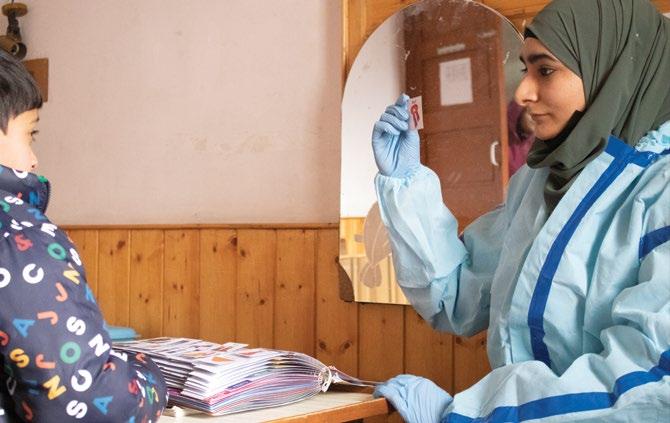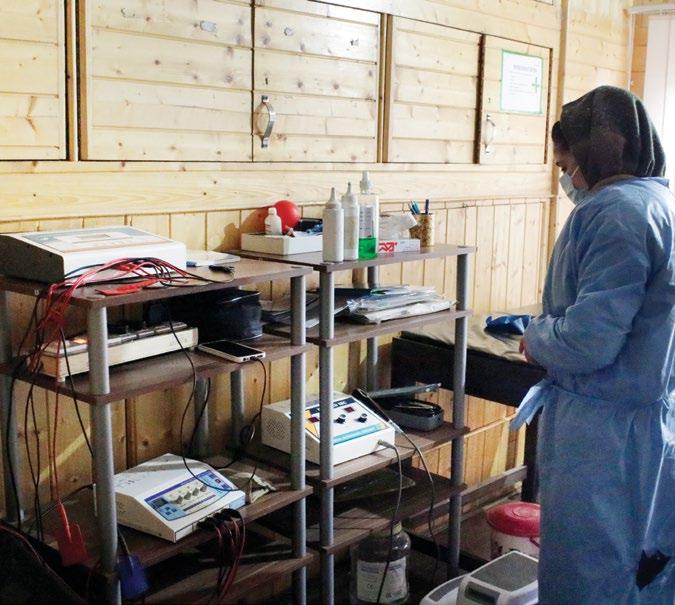
7 minute read
Learning to live with Autism
Shafaqat Gillani lives in Srinagar, J&K and serves as the founder of the Learning Edge, Early Intervention Centre for Autism and other special needs. She is the also the vice chairperson of “Autism Welfare Trust”, established in Srinagar in the year 2019. She is an Autism Light, as she has dedicated over 10 years of her life to cause of autism support and has a trademark for connecting the dots to make a true difference in the lives of children/adult with autism, at her two facilities.
Tell us about the start of your Learning Edge Centre in Srinagar?
Advertisement
Finding support and helping individuals and families affected by disabilities became my passion and purpose due to personal reasons. Having a child with special needs keeps a parent busy with doctors’ appointments, hospital stays, therapies, counselling sessions and research. I gathered a library of information pertaining to autism. Some people started referring families to me for counselling after their child was diagnosed with autism. A simple trip to the grocery store, a nearby restaurant, or a ball game is never simple for families affected by autism. This is when I realised there was a great need for a professional organization in Kashmir to help families navigate the maze of autism. With this in mind, I established the Learning Edge Centre for Autism & Early Intervention in Srinagar in March 2019.
What is autism?
Autism is a developmental disorder that presents before the age of 3 years. It’s characterized by impairment in several core domains, which include social deficits, communication difficulties, narrow restricted interests, and repetitive behaviours. In addition to that, other associated symptoms frequently coexist like inattention and motor hyperactivity, impulsivity and aggression, mood instability, EEG abnormalities or seizure related problems, and cognitive difficulties. Being autistic does not mean you have an illness or disease. It means your brain works in a different way from other people.
Mrs. Shafaqat Gillani, Founder-Learning Edge Centre and Autism Welfare Trust
How common is this disorder?
It is estimated that worldwide about one in 100 children has autism. This estimate represents an average figure, and reported prevalence varies substantially across studies. Some well-controlled studies have, however, reported figures that are substantially higher. The prevalence of autism in many low- and middle-income countries is unknown.
How do you treat autism spectrum disorders?
No cure exists for autism spectrum disorder, and there is no onesize-fits-all treatment. The goal of treatment is to maximize your child’s ability to function by reducing autism spectrum disorder symptoms and supporting development and learning. There are a few different treatment approaches. There are behavioural approaches, educational approaches, and medication approaches. There is some evidence that the earlier you pick up the problem and start to intervene with behavioural, educational, speech, sensory and occupational therapy, the better the long-term developmental trajectory.
Are there any specific activities that are particularly helpful for children with autism?
The first thing we do for children with autism is to find out what they need from us in order to have more success. If the environment is too confusing, too cluttered, too much information, we address changing the environment first. We use picture schedules, choice cards, and task analysis. Activities that involve clear choices, taking turns, and using visual materials are all helpful in working with children with autism.

What do you think needs to be done to increase the support and sponsorship for your organization?
Our Autism Center is constantly in need of funds to support the high demand for our services, which far outnumber our current resources. We are funded exclusively through small private donations and the nominal fee we charge for our services. We request the J&K administration to encourage and incentivize civil society and business houses through an additional tax deduction to increase their financial aid and voluntary contributions to organizations like ours.
We appreciate any size gift or outright donation to support our mission. Your donations of developmental toys and gadgets, stationery items, child safety items and literature, clothes, medical cover, child sponsorship commitments or zakat fund can make it possible for us to offer high quality and vital services for autistic children. For example, if we receive a donation of iPads/tablets to the centre, we can teach the child in the school/house in an integrated way so he/she can take the iPad and bring it back.
Anything else you would like to add...
In Kashmir, we see that majority of the autistic children belong to economically weaker sections of the society. Meeting the complex needs of their autistic child puts such families under a great deal of stress – emotional, financial and physical. It hurts to see many autistic children living on the streets, abandoned by relatives after the death of their parents. These seldom get any rehabilitation therapy because of the costs involved and lack of such specialized facilities and trained rehabilitation professionals in the valley.

Our universities need to design programmes and certifications for professionals who are responsible for the support and services provided to autistic individuals. The goal of these programmes should be to provide a well-rounded, multidisciplinary training programme and specialized credential to supplement professionals’ existing knowledge, and ensure they are up to date on best practices, research, and incorporate updated knowledge into professional practice. We request the government to look into the matter and take appropriate steps to fill in the void.
Untold Facts on Autism Spectrum Disorder (ASD)
• It is diagnosed four times more frequently in boys than in girls.
• Autism is the third most common developmental disability.
• Approximately 40% of children with autism do not talk.
• This condition varies from person to person, and no two autistic people are the same.
• Autism is also one of the fastest-growing developmental disorders.
• If you have a child with autism, you must stay mentally strong and brave enough to face the hurdles and work on improving the quality of life for your child.










